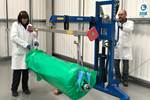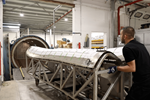Velocity Composites launches digital manufacturing cell to improve material efficiency
Industry 4.0 manufacturing cell is tailored to effectively and efficiently trace individual composite plies through the entire value stream.
Photo Credit: Velocity Composites
Aerospace supplier (Burnley, U.K.) has launched a new digital manufacturing cell designed to help improve traceability and efficiency for customers. The cell, located at Velocity Composites’ headquarters in Burnley, Lancashire, creates a process where all composite plies can be scanned, logged and sequenced efficiently to improve traceability and reduce costs.
“We aim to be at the forefront of Industry 4.0 technologies to improve the aerospace supply chain, helping customers to cut waste, become more efficient and save money,” Matthew Fisher, product and process manager at Velocity Composites, says. “Our digital manufacturing cell is the next step in our journey to improve even further. Our bespoke AVISoCS technology can help customers to fully trace each individual piece of ply within a job, as it is nested, cut and sequenced ready to be delivered.
The cell is the latest in a range of data-driven technology advances at Velocity Composites, aimed at fully tracking and tracing the aerospace supply chain for customers, improving efficiencies and making savings on material and operational costs.
Velocity’s customers have reportedly been able to reduce material waste by up to 20%.
Velocity’s own VRP technology has been designed to manage the entire value stream, from customer demand management, raw material management, batch traceability, complex nesting, kit manufacture and kit logistics, with all areas being connected and sharing real-time data to drive maximum efficiencies, including optimized operations, reduced waste and sound information upon which to make decisions.
“Customers can have a real-time view of jobs from their initial acceptance and planning, through every step before it is delivered,” Fisher emphasizes. “The basic technology is similar to what people would experience when tracking a postage delivery or ordering a takeaway, but we have specifically tailored it to our processes in composite manufacturing to add that value to the aerospace and related sectors.”
Thanks to the company’s proprietary software, Velocity’s customers have reportedly been able to reduce material waste by up to 20%, while also creating operational, stock and process efficiencies in a way which supports staff to be more effective, mitigating the impact of rising material costs while closing the gap on achieving environmental targets for the aerospace sector.
Related Content
-
Broetje-Automation demonstrates rCF placement via AFP
Through the ScrapSeRO project, the system integrator and machine builder successfully processed recycled composites, in addition to more traditional materials, via its highly flexible Staxx One system.
-
Mold 3D printing helps automate composite bathtub, shower production
As part of its efforts to automate as much of its production process as it can, Lyons Industries acquired a Massivit 10000 additive manufacturing system to quickly produce high-performance molds and support fixtures.
-
Laser cleaning in composites manufacturing
Laser cleaning technologies for cleaning production molds for composites offer alternatives to harsher, less-friendly methods with features like automation and higher power cleaning.






